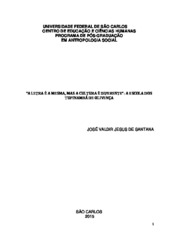| dc.contributor.author | Santana, José Valdir Jesus de | |
| dc.date.accessioned | 2016-10-04T18:55:34Z | |
| dc.date.available | 2016-10-04T18:55:34Z | |
| dc.date.issued | 2015-03-05 | |
| dc.identifier.citation | SANTANA, José Valdir Jesus de. “A letra é a mesma, mas a cultura é diferente”: a escola dos Tupinambá de Olivença. 2015. Tese (Doutorado em Antropologia Social) – Universidade Federal de São Carlos, São Carlos, 2015. Disponível em: https://repositorio.ufscar.br/handle/ufscar/7680. | * |
| dc.identifier.uri | https://repositorio.ufscar.br/handle/ufscar/7680 | |
| dc.description.abstract | In this dissertation, we aim at understanding how and why the Tupinambá from Olivença make school and how this school has become central in the production of strong people in the culture, update and production of kinship, being a relative and being in the culture, as they usually assert. Thus, we were interested in thinking how being in the culture and becoming strong in the culture are being produced from the school and the relationships enabled and coordinated by it, both internally and externally, in the movement that multiplies the school on the Indigenous territory, especially by the reclaimed areas, in order to understand this multiplier effect that relates to politics among the Tupinambá. This happens because, among these Indigenous people, making school, playing politics, claiming, producing reclaimed schools, being in the culture, producing culture, all these update and produce identity, kinship, being a relative and being smart people. | eng |
| dc.description.sponsorship | Não recebi financiamento | por |
| dc.language.iso | por | por |
| dc.publisher | Universidade Federal de São Carlos | por |
| dc.rights.uri | Acesso aberto | por |
| dc.subject | Cultura | por |
| dc.subject | Escola Tupinambá | por |
| dc.subject | Parentesco | por |
| dc.subject | Estar na cultura | por |
| dc.subject | Culture | eng |
| dc.subject | Tupinambá school | eng |
| dc.subject | kinship | eng |
| dc.subject | Living culture | eng |
| dc.title | “A letra é a mesma, mas a cultura é diferente”: a escola dos Tupinambá de Olivença | por |
| dc.type | Tese | por |
| dc.contributor.advisor1 | Cohn, Clarice | |
| dc.contributor.advisor1Lattes | http://lattes.cnpq.br/1714080901123094 | por |
| dc.description.resumo | Nesta tese, buscamos compreender como e por que os Tupinambá de Olivença fazem escola e do como esta tem se tornado central na produção de pessoas fortes na cultura, na atualização e produção de parentesco, aparentamento e no estar na
cultura, como costumam afirmar. Dessa forma, interessou-nos pensar como o estar na cultura e tornar-se forte na cultura vão sendo produzidos a partir da escola e das relações que esta possibilita e articula, tanto interno quanto externamente, no movimento que multiplica a escola pelo Território Indígena, em especial pelas áreas de retomadas, no sentido de compreender esse efeito multiplicador que se relaciona ao fazer política entre os Tupinambá. Entre os Tupinambá, fazer escola, fazer política, fazer retomada, produzir escolas em retomadas, estar na cultura, produzi cultura, atualizam e produzem identidade, parentesco, aparentamento e pessoas sabidas. | por |
| dc.publisher.initials | UFSCar | por |
| dc.publisher.program | Programa de Pós-Graduação em Antropologia Social - PPGAS | por |
| dc.subject.cnpq | CIENCIAS HUMANAS::ANTROPOLOGIA | por |
| dc.ufscar.embargo | Online | por |
| dc.publisher.address | Câmpus São Carlos | por |
| dc.contributor.authorlattes | http://lattes.cnpq.br/5087472600101533 | por |
